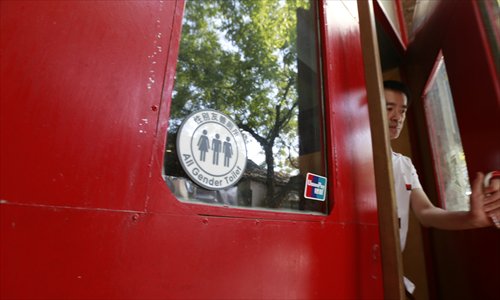HOME >> CHINA
30 Beijing locations embrace China NGO’s unisex bathroom campaign
By Zhao Yusha Source:Global Times Published: 2016/6/16 0:58:00

An "All Gender Toilet" sign hangs near the entrance of Shuangcheng Café in Beijing's Dongcheng district on Wednesday. The café is one of the 30 venues in Beijing participating in a unisex toilet campaign. Photo: Li Hao/GT
Around 30 locations across Beijing will participate in the "All Gender Toilets" program launched by a Beijing-based NGO in an effort to draw attention to gender issues in China, according to the program's director.
"By launching the program, we want to tell people that gender can no longer simply be defined by male and female only, and we want to encourage a discussion about gender and sex," Yang Gang, director of the program organized by the Beijing Gender Health Education Institute, told the Global Times on Wednesday.
Since the program's launch on May 17, around 30 locations throughout the capital city - including bars, cafés, the Beijing offices of UN Women and the UN Development Program, as well as other NGOs - have announced they will join the unisex toilet program and hang signs reading "All Gender Toilet" outside their facilities.
But many of these places have small single-person bathrooms, and shopping malls have hesitated to join the campaign, as altering their large bathrooms to make them unisex would be expensive, said Yang.
"These unisex toilets benefit transgender groups or people whose gender cannot be identified by their outfits. It also brings convenience to people who need help from caretakers of a different gender," Zhang Lin, an employee of Café Zarah in the city's downtown Dongcheng district - one of the businesses that is participating in the program - told the Global Times.
Yang also said that building "All Gender Toilets" involves more than simply hanging a sign. There are issues that need to be dealt with in larger bathrooms, such as how to make men and women comfortable with rooms that contain both urinals and facilities that cater to women's menstrual needs.
"Safety is another concern," said Yang, adding that safety hazards - including the threat of sexual assault - also exist in gender-segregated toilets.
"For public areas like shopping malls, unisex toilet programs are not suitable unless they have full security facilities. But I believe these unisex toilets can be used in office buildings," Guo Ruixiang, a project coordinator for UN Women, told the Global Times on Wednesday.
This marks the first large-scale promotion of unisex toilets in China, according to qdaily.com, though china.cn reported that 200 "unisex toilets" were introduced in Shenyang, Northeast China's Liaoning Province in 2013.
Posted in: Society